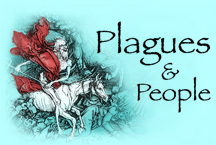In Physicke Mallowes have much reputation,
Their very name of Mellow seemes to sound,
The roote thereof will giue a kind purgation,
By them both men and women good haue found.
To women's monthly flowers they give laxation,
They make men soluble that haue beene bounde,
And least we seeme in Mallowes praises partial,
Long since hath Horace praised them and Martial.
The wormes that gnaw the womb and neuer stint,
Are kill'd, and purg'd, and driuen away with Mint. |
|
| MALLOWS, and MARSH-MALLOWS (from Culpeper, pp. 77-78):
The Common Mallowes are generally so well known that they need no Description.
Our common Marsh-mallows have divers soft hoary white stalkes rising to be three or four foot high, spreading forth many Branches the Leavs wherof are soft and hairy, somwhat lesser then the other Mallow Leaves but longer pointed, cut (for the most part) into some few deivisions, but deep: The Flowers are many but smaller also then the other Mallows & white, or tending to a blush colour. After which come such like round cases and Seed as in the other Mallows. The Roots are many and long, shooting from one Head, of the bigness of a Thumb or Finger, very pliant, tough and bending like Liquoris, of a whitish yellow colour on the outside, and more white within, full of a slimy juyce which being, layd in water will thicken it as if it were gelly....
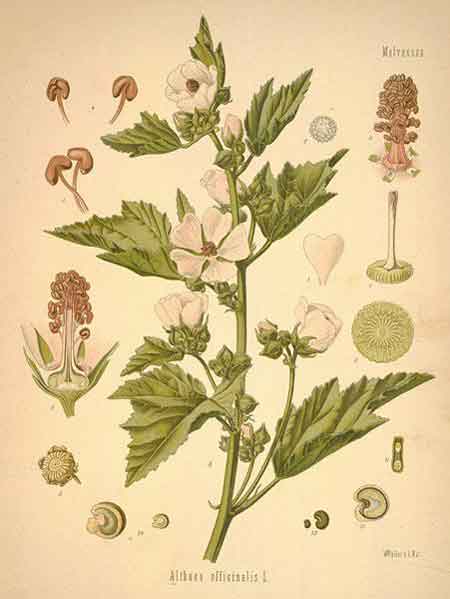
Vertues and Use -- The Leavs of either of the sorts above named, and the Roots also boyled in Wine or Water, or in Broth, with Parsley or Fennel Roots, doth help to open the Body, and is very convenient in hot Agues or other distempers of the Body to apply the Leavs so boyled warm to the Belly; It not only voideth hot Chollerick and other offensive Humors, but easeth the pains and torments of the Belly coming thereby; and are therefore used in all Clysters conducing to those purposes: The same used by Nurses, procureth them store of Milk.
The Decoction of the Seed of any of the common Mallows, made in Milk or Wine doth Merveilously help excoriations, the Phtisick, Plurisie, and other Diseases of the Chest and Lungues that proceed of hot causes, if it be continued taking for sometime together: The Leavs and Roots work the same effects: They help much also in the excoriations of the Guts and Bowels and hardness of the Mother, and in all hot and sharp diseases thereof. The Juyce drunk in Wine, or the Decoction of them therein doth help Women to a speedy and easie Delivery. Pliny saith, That whosoever shal take a spoonful of any of the Mallows, shal that day be free from all Diseases that may come unto him; and that it is special good for the Falling-sickness. The Syrup also and Conserve made of the Flowers are very effectual for the same Diseases, and to open the Body being costive:
The Leavs bruised and laid to the Eyes with a little Honey, taketh away the Impostumations of them. The Leavs bruised or rubbed upon any place stung with Bees, Wasps or the like, presently taketh away the pains, redness, and Swellings that rise thereupon: and Dioscorides saith, The Decoction of the Leavs and Roots helpeth all sorts of Poyson, so as the Poyson be presently voided by Vomit. A Pultis made of the Leavs boyled and bruised, whereunto some Bean or Barley Flower and Oyl of Roses is an especial Remedy against all hard Tumors and Inflamations of Impostums and Swellings of the Cods and other parts, and easeth the pains of them; as also against the hardness of the Liver or Spleen, being applied to the places.
The Juyce of the Mallows boyled in old Oyl and applied, taketh away al roughness of the Skin, as also the Scurf, Dandrif, or dry Scabs in the Head or other parts if they be anointed therewith, or washed with the Decoction, and preserveth the Hair from falling off. It is also effectual against Scaldings and Burnings, St. Anthonies fire, and all other hot, red, and painful Swellings in any part of the Body. The Flowers boyled in Oyl or Water (as every one is disposed) wherunto a little Honey and Allum is put, is an excellent Gargle to wash, clens, and heal any sore Mouth or Throat in a short space. If the Feet be bathed or washed with the Decoction of the Leavs, Roots, and Flowers, it helpeth much the Defluxions of Rhewm from the Head. If the Head be washed therewith, it staieth the falling and shedding of the Hair. The green Leavs (saith Pliny) beaten with Nitre and applied draweth out Thorns, or Pricks in the Flesh.
The Marsh Mallows are more effectual in al the Diseases before mentioned: The Leavs are likewise used to loosen the Belly gently, and in Decoctions for Clysters, to eas al pains of the Body, opening the strait Passages, and making them slippery, whereby the Stone may descend the more easily and without pain, out of the Reins, Kidneys, and Bladder, and to eas the torturing pains thereof: But the Roots are of more especial use for those purposes, as well as for Coughs, Hoarsness, shortness of Breath, and Wheesings, being boyled in Wine or Honeyed Water and drunk. The Roots and Seeds hereof boyled in Wine or Water, is with good success used by them that have Excoriations in the Guts, or the bloody Flux, by qualifying the violence of the sharp fretting Humors, easing the pains, and healing the Soreness: It is profitably taken of them that are troubled with Ruptures, Cramps, or Convulsions of the Sinews; and boyled in white Wine for the Impostumes of the Throat, commonly called the Kings Evil, and of those Kernels that rise behind the Ears, and Inflamations or Swellings in Womens Breasts.
The dried Roots boyled in Milk and drunk is special good for the Chin-Cough. Hippocrates used to give the Decoction of the Roots, or the Juyce therof to drink to those that were wounded, and ready to faint through loss of Blood, and applied the same, mixed with Honey and Rozin to the Wounds: As also the Roots boyled in Wine to those that had received any Hurt by Bruises, Falls, or Blows, or had any Bone or Member out of Joynt, or any Swelling pain, or ach in the Muscles, Sinews, or Arteries. The Muccilage of the Roots, and of Linseed, and of Fennugreek put together, is much used in Pultises, Oyntments, and plaisters, to mollifie and digest all hard Swellings, and the Inflamation of them, and to eas pains in any part of the Body. The Seed either green or dry mixed with Vinegar clenseth the Skin of the Morphew, and al other discolourings, being bathed therewith in the Sun.
You may remember that not long since there was a raging Disease called the Bloody Flux, the Colledg of Physitians not knowing what to make of it, called it the Plague in the Guts, for their wits were at ne plus ultra about it. My son was taken with the same Disease, and the excoriation of his Bowels was exceeding great; my self being in the Country was sent for up, the only thing I gave him was Mallows bruised and boyled both in his Milk and Drink, in two daies (the blessing of God being upon it) it cured him, and I here to shew my thankfulness to God in communicating it to his Creatures, leav it to posterity. |
But who can write thy worth (Ô soueraigne Sage),
Some ask how men can die, where thou dost grow.
Oh that there were a Medicine curing age,
Death comes at last, though death comes nere so slow:
Sage strengths the sinews, Feauers heat doth swage,
The Palsie helpes, and rids of mickle woe,
In Latine (Saluia) takes the name of safety,
In English (Sage) is rather wise then crafty:
Sith then the name betokens wise, and sauing,
We count it nature's frend and worth the hauing. |
[mickle -- much] |
SAGE (from Culpeper, p. 212):
Our ordinary Garden Sage needeth no Description.
Vertues and Use -- A Decoction of the Leavs and Branches of Sage made and drunk, saith Dioscorides provoketh Urine, bringeth down Womens Courses, helpeth to expel the dead Child, and causeth the hairs to become black; It staieth the bleeding of Wounds, and clenseth foul Ulcers or Sores; The said Decoction made in Wine taketh away the itching ofthe Cods if they be bathed therwith. Agrippa saith, That if Women that cannot conceive by reason of the moist slipperiness of their Wombs shall take a quantity of the Juyce of Sage with a little Salt for four daies before they company with their Husbands, it will help them not only to Conceive, but also to retain the Birth without miscarrying. Orpheus saith, Three spoonfuls of the Juyce of Sage taken fasting with a little Honey, doth presently stay the spitting or casting up of Blood. For them that are in a consumption, these Pills are much commended. Take of Spicknard and Ginger of each two drams; of the Seed of Sage toasted at the fire, eight drams, of long Pepper twelve drams, all these being brought into fine Pouder, put thereto so much Juyce of Sage as may make them into a Mass for Pills, taking a dram of them every morning fasting, and so likewise at night, drinking a little pure Water after them. Mathiolus saith, it is very profitable for all manner of pains of the Head coming of cold and Rhewmatick Humors, as also for all pains of the Joynts, whether used inwardly or outwardly, and therfore helpeth the Falling-sickness, the Lethargy, such as are dull and heavy of spirit, the Palsey, and is of much use in all Defluxions of Rhewm from the Head, and for the Diseases of the Chest or Breast. The Leavs of Sage and Nettles bruised together, and laid upon the Impostume that riseth behind the Ears, doth asswage it much: The Juyce of Sage taken in warm water, helpeth a Hoarsness and the Cough.
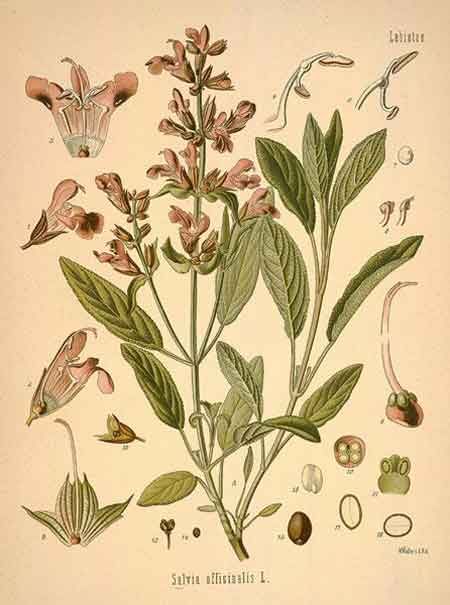
The Leavs sodden in Wine and laid upon the place affected with the Palsey helpeth much, if the Decoction be drunk also. Sage taken with Wormwood is used for the bloody Flux. Pliny saith, it procureth Womens Courses, and stayeth them coming down too fast, helpeth the stinging and biting of Serpents, and killeth the Worms that breed in the Ears and in Sores. Sage is of excellent use to help the Memory, warming and quickning the senses; and the Conserve made of the Flowers is used to the same purpose, and also for all the former recited Diseases. The Juyce of Sage drunk with Vinegar hath been of good use in the time of Plague at all times. Gargles likewise are made with Sage, Rosemary, Honeysuckles, and Plantane boyled in Wine or Water, with some Honey and Allum put thereto, to wash sore Mouthes and Throats, Cankers, or the secret parts of man or woman as need requireth. And with other hot and comfortable Herbs. Sage is boyled to bath the Body or Legs in the Summer time, especially to warm cold Joynts or Sinews troubled with the Palsey or Cramp, and to comfort and strengthen the parts. It is much commended against the Stitch or pains in the side coming of Wind, if the place be fomented warm with the Decoction thereof in Wine, and the Herb after the boyling be laid warm also thereunto. |
Take Sage and Primrose, Lauender, and Cresses,
With Walwort that doth grow twixt lime and stone,
For he that of these herbes the iuice expresses,
And mix with powder of a Castor-stone,
May breed their ease whom Palsie much oppresses,
Or if this breed not helpe, then looke for none.
Rew is a noble herbe to giue it right,
To chew it fasting it will purge the sight.
One quality thereof yet blame I must,
It makes men chaste, and women fills with lust. |
|
| MEADOW RUE (from Culpeper, pp. 209-210):
This riseth up with a yellow stringy Root, much spreading in the ground, and shooting forth new sprouts round about, with many Herby green Stalks two foot high, crested all the length of them, set with Joynts here and there, and many large Leavs on them as well as below, being devided into smaller Leavs, nicked or dented in the forepart of them, of a sad green colour on the upperside, and pale green underneath: Toward the top of the Stalk there shooteth forth divers short Branches, on every one thereof there stand two, three, or four smal round Heads or Buttons, which breaking the skin that incloseth them shew forth a tuft of pale greenish yellow threds, which falling away there comes in their place small three cornre'd Cods, wherein is contained smal, long, and round Seed. The whol Plant hath a strong unpleasant scent.
Vertues and Use -- Dioscorides saith that this Herb bruised and applied perfectly healeth old Sores: and the distilled water of the Herb and Flowers doth the like. It is used by some among other Pot-herbs to open the Body and make it soluble; but the Roots washed clean, and boyled in Ale and drunk provoketh to the Stool more than the Leavs; but yet very gently. The Root boyled in Water, and the places of the Body most troubled with Vermine or Lice, washed therewith while it is warm, destroyeth them utterly. In Italy it is used against the Plague, and in Saxony against the Jaundice, as Camerarius saith.
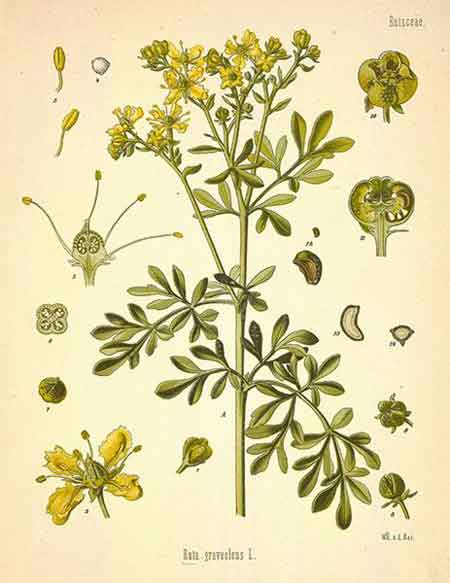
GARDEN RUE:
This is so well known, both by this name, and the Name Herb of Grace, that I shal not need to write you any further Description of it: But shall only shew you the Vertues of it as followeth.
Vertues and Use -- It provoketh Urine and Womens Courses, being taken either in Meat or Drink. The Seed thereof taken in Wine, is an Antidote against all dangerous Medicines or deadly Poysons. The Leavs taken either by themselves, or with Figs and Walnuts is called Methridates his Counter poyson, against the Plague and causeth all Venemous things to become harmless: Being often taken in Meat or Drink it abateth Venery, and destroyeth the ability to beget Children. A Decoction made thereof with some dried Dill Leavs and Flowers, easeth all pains and torments inwardly to be drunk, and outwardly to be applied warm to the place grieved. The same being drunk helpeth the pains both of the Chest and Sides, as also Coughs, hardness of breathing, the Inflamations of the Lungs, and the tormenting pains of the Sciatica, and the Joynts, being anointed or laid to the places, as also the shaking Fits of Agues, to take a draught before the Fit come: Being boyled or infused in Oyl it is good to help the wind Chollick, the hardness or windiness of the Mother, and freeth women from the strangling or suffocation thereof, if the Share and the Parts thereabouts be anointed therewith: It killeth and driveth forth the Worms of the Belly, if it be drunk after it is boyled in Wine to the half with a little Honey: It helpeth the Gout or pains in the Joynts of Hands, Feet, or Knees applied thereunto: and with Figs it helpeth the Dropsie being bathed therewith: being bruised and put into the Nostrils it staieth the Bleeding thereof. It helpeth the swelling of the Cods if they be bathed with a Decoction of Rue and Bay Leaves. It taketh away Wheals and Pimples if being bruised with a few Mirtle Leavs, if it be made up with Wax and applied: It cureth the Morphew and taketh away all sorts of Warts, if boyled in Wine with some Pepper and Nitre and the places rubbed therewith: and with Allum and Honey, helpeth the dry Scab or any Tetter or Ringworm: The Juyce thereof warmed in a Pomegranate Shel or Rind, and dropped into the Ears helpeth the pains of them. The Juyce of it and Fennel with a little Honey, and the Gall of a Cock put thereto, helpeth the dimness of the Eyesight. An Oyntment made of the Juyce therof with Oyl of Roses, Ceruss, and a little Vinegar, and anointed cureth St. Anthonies Fire, and all foul running Sores in the Head; and the stinking Ulcers of the Nose or other parts. The Antidote used by Methridates every morning fasting to secure himself from any Poyson or Infection, was this. Take twenty Leavs of Rue, a little Salt, a couple of Walnuts, and a couple of Figs beaten together into a Mass with twenty Juniper berries, which is the quantity appointed for every day.
Another Electuary is made thus; Take of Nitre, Pepper, and Cummin Seed, of each equal Parts, of the Leavs of Rue clean picked, as much in weight as all the other three weighed, beat them well together, and put to as much Honey as will make it up into an Electuary; (but you must first steep your Cummin seed in Vinegar twenty four hours, and then dry it, or rather toast it in a hot Fire-shovel, or in an Oven) and it is a Remedy for the pains or griefs of the Chest or Stomach, of the Spleen, Belly or Sides, by Wind or Stitches; of the Liver by Obstructions, of the Reins and Bladder by the stopping of Urine, and helpeth also to extenuate fat corpulent Bodies.
What an Infamy is cast upon the Ashes of Methridates (or Methradates, as the Augustanes read his name) by unworthy people; they that deserve no good report themselves, love to give none to others, Viz. That that renowned King of Pontus fortified his Body by Poyson against Poyson (He cast out Devils by Beelzebub the Prince of Devils) what a sot is he that knows not if he had accustomed his Body to cold Poysons hot Poysons would have dispatch'd him, or the contrary if not, corrosions would have done it, the whol world is at this very time beholding to him for his Studies in Physick, and he that useth the quantity of but a Hazel Nut of that Recept every morning, to which his name is adjoyned shall to admiration preserve his Body in health, if he do but consider that Rue is an Herb of the Sun and under Leo, and gather it and the rest accordingly. |
Fayre Ladies, if these Physicke rules be true,
That Rew hath such strange qualities as these,
Eat little Rew, least your good husbands (REW)
And breed betweene you both a shrow'd disease.
Rew, whets the wit, and more to pleasure you,
In water boil'd, it rids a roome of fleas.
I would not to you Ladies, Onyons praise,
Saue that they make one fayre (Aesclapius saies)
Yet taking them requires some good direction,
They are not good alike for each complexion. |
|
If vnto Choller men be much inclin'd,
Tis thought that Onyons are not good for those,
But if a man be Flegmatique (by kind)
It does his stomacke good, as some suppose,
For ointment iuice of Onyons is assign'd
To heads whose haire falls faster than it growes:
If Onyons cannot helpe in such mishap,
A man must get him a Gregorian cap.
And if your hound by hap should bite his master,
With Honey, Rew, and Onyons make a plaister. |
|
The seed of Mustard is the smallest graine,
And yet the force thereof is very great,
It hath a present power to purge the braine,
It addes vnto the stomacke force and heat:
All poyson it expels, and it is plaine,
With sugar tis a passing sawce for meat.
She that hath hap a husband bad to bury,
And is therefore in heart not sad, but merry:
Yet if in shew good manners she will keepe,
Onyons and Mustardseed will make her weepe. |
|
| MUSTARD (from Culpeper, pp. 87-88):
The common Mustard hath large and broad rough Leavs, very much jagged with uneven, and unorderly gashes, somwhat like Turnip Leavs, but lesser and rougher: The Stalk riseth to be more than a foot high, and somtimes two foot high, being round, rough, and branched at the top, bearing such like Leavs thereon as grow below, but lesser, and less devided; and divers yellow Flowers one above another at the tops; after which come smal rough pods, with smal lank flat ends, wherein is contained round yellowish Seed, sharp, hot, and biting upon the Tongue: The Root is smal, long, and woody, when it beareth Stalks and perisheth every yeer....
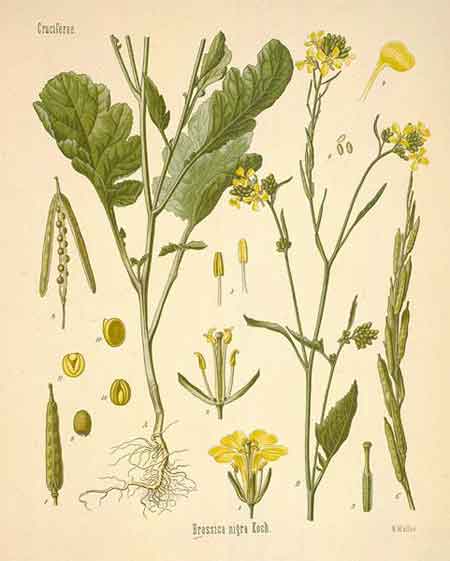
Vertues and Use -- Mustard Seed hath the Vertue of Heating, discussing, rarefying and drawing out Splinters of Bones, and other things out of the Flesh. It is of good effect to bring down Womens Courses, for the Falling sickness or Lethargy, drousie forgetful evil, to use it both inwardly and outwardly to rub the Nostrils, Forehead, and Temples, to warm and quicken the Spirits, for by the fierce sharpness it purgeth the Brain by sneezing, and drawing down Rhewm and other Viscuous Humors, which by their Distillations upon the Lungs and Chest procure coughing, and therefore with some Honey added thereto doth much good therein. The Decoction of the Seed made in Wine and drunk, provoketh Urine, resisteth the force of Poyson, the Malignity of Mushroms, and the Venom of Scorpions, or other Venemous Creatures, if it be taken in time: and taken before the cold fits of Agues, altereth, lesseneth, and cureth them.
The Seed taken either by it self or with other things either in an Electuary or Drink, doth mightily stir up Bodily lust, and helpeth the Spleen and pains in the sides, and gnawing in the Bowels. And used as a Gargle, draweth up the Pallat of the Mouth being fallen down, and also it dissolveth the Swellings about the Throat, if it be outwardly applied. Being chewed in the Mouth, it oftentimes helpeth the Toothach: The outward application hereof upon the pained place of the Sciatia, discusseth the Humors, and easeth the pains, as also of the Gout, and other Joynt aches. And is much and often used to eas pains in the sides of loyns, the shoulders or other parts of the Body, upon the applying thereof to rais Blisters, and cureth the Diseas by drawing it to the outward part of the Body: It is also used to help the falling of the Hair: The Seed bruised, mixed with Honey and applied, or made up with Wax, taketh away the Marks, and black and blue spots of Bruises or the like, the roughness or Scabbedness of the Skin, as also the Leprosie and lowsie evil: it helpeth also the crick in the Neck. The distilled Water of the Herb when it is in Flower is much used to drink inwardly to help in any the Diseases aforesaid, or to wash the Mouth when the Pallat is down, and for the Diseases of the Throat to gargle, but outwardly also for Scabs, Itch, or other like Infirmities, and clenseth the Face from Morphew, Spots, Freckles, and other Deformities.
It is an excellent Sawce for such whose Blood wants clarifying and for weak Stomachs being an Herb of Mars, but naught for Chollerick people, though as good for such as are aged or troubled with cold Diseases, Aries claims somthing to do with it, therfore it strengthens the heart and resisteth poyson, let such whose Stomachs are so weak, they cannot digest their meat or appetite it, take of Mustard Seed a dram, Cinnamon as much, and having beaten them to Pouder ad half as much Mastich in Pouder, and with Gum Arabick dissolved in Rose Water, make it up into Troches, of which they may take one of about half a dram weight an hour or two before meals, let old men and women make much of this medicine, and they will either give me thanks, or manifest ingratitude. |
Though Violets smell sweet, Nettles offensiue,
Yet each in seuerall kind much good procure,
The first doth purge the heauie head and pensiue,
Recouers surfets, Falling sickeness cures.
Tho Nettles stinke, yet make they recompence,
If your bellie by the Collicke paine indures:
Against the Collicke Nettle-seed and Honey,
Is Physicke; better none is had for money.
It breedeth sleepe, staies vomits, flegme doth soften,
It helpes him of the Gowt that eats it often. |
[flegme -- phlegm]
|
Cleane Hysop is an herbe to purge and cleanse,
Raw flegmes, and hurtfull humours from the breast;
The same vnto the Lungs great comfort lends,
With
Honey boil'd: but farre aboue the rest,
It giues good colour, and complexion mends,
And is therefore with women in request:
With Honey mixt, Cinquefoyle cures the Canker,
That eats our inward parts with cruel ranker,
But mixt with Wine, it helpes a greeued side,
And staies the vomit, and the Laske beside. |
[Laske -- diarrhea] |
| HYSOP (from Culpeper, p. 66):
This is so well known to be an Inhabitant in every Garden, that it wil save me Labor in writing a Description thereof. The Vertues are as followeth.
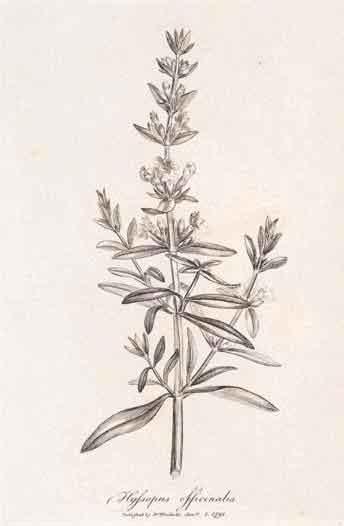
Vertues and Use -- Dioscorides saith that Hysop boyled with Rue and Honey, and drunk, helpeth those that are troubled with Coughs, shortness of breath, wheesing, and Rhewmatick Distillations upon the Lungs: Taken also with Oximel, it purgeth gross Humors by the Stool; and with Honey killeth Worms in the Belly; and with fresh or new Figs bruised, helpeth to loosen the Belly, and more forcibly if the Root of Flower-de-luce and Cresses be added therto. It amendeth and cherisheth the Native colour of the Body spoiled by the yellow Jaundice, and being taken with Figs and Nitre helpeth the Dropsie and the Spleen. Being boyled with Wine, it is good to wash Inflamations: and taketh away black and blew Spots and Marks that come by Strokes, Bruises, or Fals, being applied with warm Water.
It is an excellent Medicine for the Quinsie, or Swelling in the Throat, to wash and gargle it, being boyed with Figs. It helpeth the Toothach, being boyled in Vinegar, and gargled therwith. The hot Vapors of the Decoction taken by a Funnel in at the Ears, easeth the Inflamations and singing nois of them: Being bruised and Salt, Honey, and Cummin Seed put to it, it helpeth those that are stung by Serpents. The Oyl thereof being anoynted killeth Lice, and taketh away Itching of the Head: It helpeth those that have the Falling-sickness which way soever it be applied: It helpeth to expectorate tough Flegm, and is effectual in al cold Griefs, or Diseases of the Chest and Lungs, being taken either in a Syrup or licking Medicine. The green Herb bruised and a little Sugar put thereto, doth quickly heal any cut, or green Wound, being therunto applied....
CINKFOYL, or FIVE LEAVED GRASS (from Culpeper, pp. 33-34):
This spreadeth and creepeth far upon the ground, with long slender strings like Strawberries, which take Root again and shooteth forth many Leavs made of five parts, and somtimes of seven, dented about the edges and somwhat hard; The Stalks are slender leaning downwards, and bear many smal yellow Flowers theron, with some yellow threds in the middle, standing about a smooth green head; which when it is ripe is a little rough, and containeth smal brownish Seeds. The Root is of a blackish brown colour, seldom so big, as ones little finger but growing long with some threds therat; and by the smal strings it quickly spreadeth over the ground.
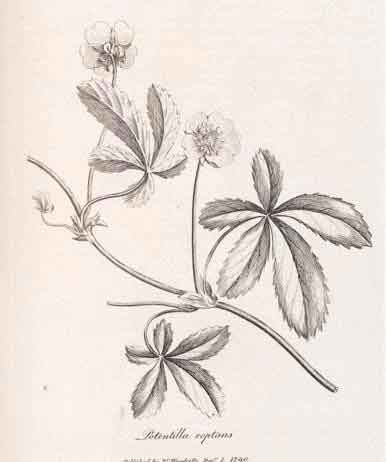
Vertues and Use -- It is an especial Herb used in all Inflamations and Feavers whether Infectious or Pestilential; or among other Herbs to cool, and temper the Blood and humors in the Body; As also for all Lotions, Gargles, Injections, and the like for sore Mouths, Ulcers, Cankers, Fistulaes, and other corrupt Foul, or running sores. The Juyce herof drunk about four ounces at a time for certain daies together, cureth the Quinsie, and the yellow Jaundice, and taken for thirty daies together cureth the Falling-sickness.
The Roots boyled in Milk and drunk is a most effectual remedy, for all Fluxes in Man or Woman, whether the Whites, or Reds, as also the Bloody Flux. The Roots boyled in Vinegar, and the Decoction therof held in the Mouth easeth the pains of the Toothach. The Juyce or Decoction taken with a little Honey, helpeth the hoarsness of the Throat, and is good for the Cough of the Lungs. The distilled Water of both Roots and Leavs is also effectual to all the purposes aforesaid: and if the Hands be often washed therin and suffered at every time to dry in of it self without wiping, it wil in short time help the Palsy or shaking in them. The Roots boyled in Vinegar, helpeth all Knots, Kernels, hard swellings, and lumps growing in any part of the Flesh, being therto applied; as also al Inflamations, and St. Anthonies Fire, all Imposthumes, and painful Sores, with heat and putrefaction; the shingles also, and all other sorts of running, and foul Scabs, Sores, and Itch. The same also boyled in Wine, and applied to any Joynts full of pain and ach, or the Gout in the Hands or Feet, or the Hip-gout called the Sciatica, and the Decoction therof drunk the while, doth cure them; and easeth much pains in the Bowels. The Roots are likewise effectual to help Ruptures or Burstings, being used with other things available to that purpose, taken either inwardly or outwardly, or both; as also for Bruises, or Hurts by Blows, Falls, or the like, and to stay the bleeding of Wounds in any part inward or outward.
This is an Herb of Jupiter, and therfore strengthens the parts of the Body that he rules, let Jupiter be angular and strong when it is gathered, and if you give but a scruple (which is but twenty grains of it) at a time, either in white Wine, or white Wine Vinegar, you shal very seldom miss the cure of an Ague be it what Ague soever in three Fits, as I have often proved to the admiration both of my self and others, let no Man despise it becaus it is plain and easie, the waies of God are all such, 'tis the ungodliness and impudencey of Man that made things hard, and hath (by so doing) made sport for al the Devils in Hell, and grieved the good Angels, and when you reade this your own Genius if you be any thing at al acquainted with it, may dictate to you many as good Conclusions both of this and other Herbs.
Some hold that one Leaf cures a Quotidian, three a Tertian, and four a Quartan Ague, and a hundred to one if it be not Dioscorides, for he is ful of such Whimseys. The truth is I never stood so much upon the number of the Leavs, nor whether I gave it in Pouder or Decoction: If Jupiter were strong and the Moon applying to him or his good aspect at the gathering of it, I never knew it miss the desired effects. |
Ellecompane strengthens each inward part,
A little looseness is thereby provoken:
It swageth greefe of mind, it cheeres the heart,
Allayeth wrath, and makes a man fayre spoken:
And drunke with Rew in Wine, it doth impart
Great helpe to those that haue their bellies broken.
Let them that vnto choller much incline,
Drinke Penny-royal steeped in their wine,
And some affirme, that they haue found by trial
The paine of Gowt is cur'd by Penny-royal. |
|
| ELECAMPANE (from Culpeper, p. 48):
This shooteth forth many large Leavs, long, and broad, lying neer the ground, smal at both ends, somwhat soft in handling, of a whitish green on the upper side, and gray underneath, each set upon a short Footstalk; from among which rise up divers great, and strong hairy Stalks, three or four foot high with some Leavs thereon compassing them about at the lower ends, and are branched toward the tops, bearing divers great and large Flowers like those of the Corn Marigold, both the Border of Leavs and the middle thrum being yellow, which turn into Down; with long small brownish Seed among it, and is carried away with the wind. The Root is great and thick, branched forth divers waies, blackish on the outside, and white within, of a very bitter tast, and strong, but good sent, especially when they are dryed, no part els of the Plant having any smel....
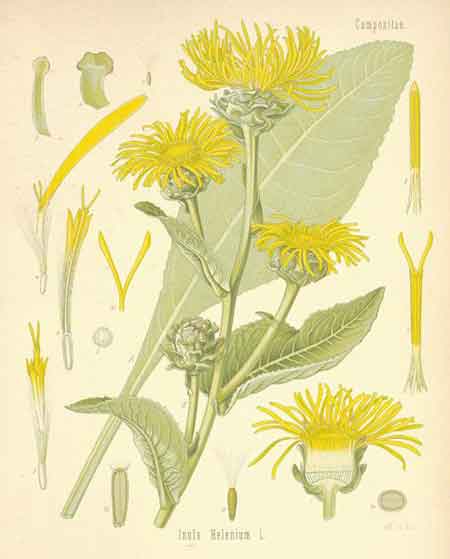
Vertues and Use -- The fresh Roots of Elcampane preserved with Sugar, or made into a Syrup or Conserve, are very effectual to warm a cold and windy Stomach, or the pricking therin, and Stiches in the Sides caused by the Spleen; and to help the Cough, shortness of Breath, and wheesing in the Lungs. The dried Root made into Pouder, and mixed with Sugar and taken, serveth to the same purposes, and is also profitable for those that have their Urine stopped; or the stopping of Womens Courses, the pains of the Mother, and of the Stone in the Reins, Kidneys, or Bladder: It resisteth Poyson, and stayeth the spreading of the Venom of Serpents, as also of putrid and pestilential Feavers, and the Plague it self. The Roots and Herb beaten and put into new Ale or Beer, and dayly drunk, cleareth, strengthneth, and quickneth the Sight of the Eyes wonderfully. The Decoction of the Roots in Wine or the Juyce taken therin, killeth and driveth forth all manner of Worms in the Belly, Stomach, and Maw; and gargled in the mouth; or the Root chewed fastneth loos Teeth, and helpeth to keep them from Putrefaction: And being drunk is good for those that spit Blood, helpeth to remove Cramps or Convulsions, and the pains of the Gout, the Sciatica, the loosness and pains in the Joynts, or those Members that are out of Joynt, by cold or moisture hapning to them, applied outwardly as well as inwardly, and is good for those that are bursten, or have any inward bruis. The Roots boyled well in Vinegar, beaten afterwards and made into an Oyntment, with Hogs Suet or Oyl of Trotters is an excellent remedy for Scabs or Itch in yong or old: The places also bathed or washed with the Decoction doth the same; it also helpeth all sorts of filthy, old, putrid Sores or Cankers wheresoever. In the Roots of this Herb lieth the chief effect for all the Remedies aforesaid: The distilled Water of the Leavs and Roots together is very profitable to clens the Skin of the Face or other parts, from any Morphew, Spots, or Blemishes therein, and maketh it cleer.
PENY-ROYAL (from Culpeper, pp. 191-192):
This is so well known unto all (I mean the common kind) that it needeth no Description.
There is a greater kind than the ordinary sort found wild with us, which so abideth being brought into Gardens, and differeth not from it but only in the largeness of the leavs and Stalks, in rising higher, and not creeping upon the ground so much. The Flowers whereof are Purple, growing in Rundles about the Stalk like the other....
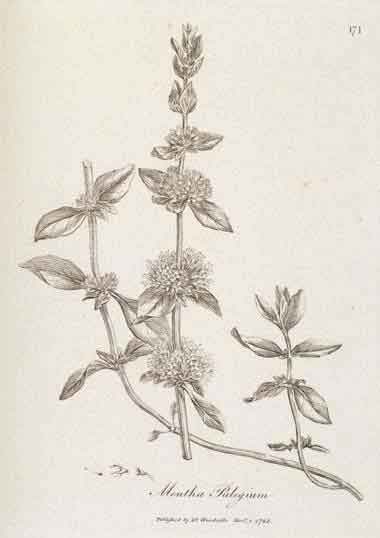
Vertues and Use -- Dioscorides saith, That Peny-royal maketh thin, tough Flegm, warmeth the coldness of any part whereto it is apylied, and digesteth raw or corrupt matter: Being boyled & drunk, it provoketh Womens Courses and expelleth the dead Child and afterbirth, and staieth the disposition to Vomit, being taken in Water and Vinegar mingled together. And being mingled with Honey and Salt it avoideth Flegm out of the Lungs, and purgeth Melancholly by the Stool. Drunk with Wine it helpeth such as are bitten or stung with Venemous Beasts: and applied to the Nostrils with Vinegar, reviveth those that are fainting and swouning.
Being dried and burnt it strengtheneth the Gums; It is helpful to those that are toubled with the Gout being applied of it self to the place until it wax red: and applied in a Plaister, it taketh away spots or marks in the Face: Applied with Salt, it profiteth those that are Splenetick or Liver-grown. The Decoction doth help the Itch, if washed therwith: Being put into Baths for Women to sit therein, it helpeth the Swelling and hardness of the Mother. The green Herb bruised and put into Vinegar clenseth foul Ulcers, and taketh away the marks and bruises of blows about the Eyes, and all discolourings of the Face by fire, yea and the Leprosie, being drunk and outwardly applied: Boyled in Wine with Honey and Salt, it helpeth the Toothach. It helpeth the cold Griefs of the Joynts, taking away the pains, and warming the cold parts, being fast bound to the place after a bathing, or sweating in an hot hous. Pliny addeth that Penny-royal and Mints together help faintings or swounings, being put into Vinegar, and put to the Nostrils to be smelled unto, or a little thereof put into the Mouth. It easeth the Headach, and the pains of the breast and Belly, stayeth the gnawing of the Stomach, and inward pains of the Bowels; being drunk in Wine it provoketh Womens Courses, and expelleth the dead child and afterbirth: Being given in Wine it helpeth the Falling-sickness: Put into unwholsom or stinking Water that men must drink (as at Sea, and where other cannot be had) it maketh them the less hurtful: It helpeth Cramps or Convulsions of the Sinews being applied with Honey, Salt, and Vinegar. It is very effectual for the Cough, being boyled in Milk and drunk, and for Ulcers or Sores in the Mouth. Mathiolus saith, The Decoction thereof being drunk, helpeth the Jaundice and Dropsie, and all pains of the Head and Sinews that come of a cold caus, and that it helpeth to clear and quicken the Eyesight. Applied to the Nostrils of those that have the Falling-sickness, or the Lethargy, or put into the Mouth, it helpeth them much, being bruised and with Vinegar applied. And applied with Barley Meal, it helpeth Burnings by fire, and put into the Ears, easeth the pains of them. |
To tell all Cresses' virtues long it were,
But diuers patients vnto that are debter,
It helpes the teeth, it gives to balde men haire,
With Honey mixt, it Ringworme kills and Tettar:
But let not women that would children beare,
Feed much thereof, for they to fast were better.
An hearbe there is takes of the Swallowes name,
And by the Swallowes gets no little fame,
For Pliny writes (tho some thereof make doubt),
It helps young Swallowes eies when they are out. |
[Tettar -- tetters; term used for a variety of itching skin diseases]
[hearbe -- the poet is referring to celandine whose name derives from the Greek word for swallow: "The swallow has shown us that the chelidonia is very serviceable to the sight, by the fact of its employing it for the cure of its young, when their eyes are affected." -- Pliny the Elder, Natural History, VIII, 41.] |
|
SCIATICA-CRESSES (from Culpeper, p. 39):
These are of two kinds; The first riseth up with a round Stalk about two foot high spread into divers Branches, whose lower Leavs are somwhat larger than the upper, yet all of them cut, or torn on the edges, somewhat like unto Garden Cresses, but smaller: The Flowers are smal and white, growing at the tops of the Branches, where afterwards grow Husks with smal brownish Seed therin, very strong and sharp in tast, more than the Cresses of the Garden: The Root is long, white and woody.
The other hath the lower leavs whol, somwhat long and broad not torn at al, but only somwhat deeply dented about the edges towards the ends, but those that grow up higher are lesser. The Flowers and Seed are like the former, and so is the Root likewise: and both Root and Seed as sharp as it....
Vertues and Use -- The Leavs, but especially the Roots taken fresh in the Sumer time, beaten & made into a Pultis or Salve, with old Hogs Greas, and applied to the place pained with the Sciatica, to continue theron four hours if it be on a Man, and two hours on a Woman; the place afterwards bathed with Wine and Oyl mixed together, and then wrapped with Wool or Skins after they have set a little, wil assuredly cure not only the same Diseas in the Hips, Hucklebone, or other of the Joynts, as the Gout in the Hands or Feet, but all other old Griefs of the Head (as inveterate Rhewms) and other part of the Body that is hard to be cured: And if of the former Griefs any part remain; the same Medicine after twenty daies is to be applied again. The same is also effectual in the Diseases of the spleen and applied to the Skin it taketh away the blemishes therof, whether they be Scars, Leprosie, Scabs or Scurf: which although it exulcerate the part, yet that is to be helped afterwards with a Salve made of Oyl and Wax.
Esteem of this as another Secret.
WATER-CRESSES:
Our ordinary Water-Cresses spreadeth forth with many weak hollow sappy Stalks, shooting out fibres at the Joynts and upwards, long winged Leavs, made of sundry broad, sappy and almost round Leavs of a brownish green colour. The Flowers are many and white, standing on long Footstalks, after which come small yellow Seed, contained in smal long pods like Horns: The whol Plant abideth green in the Winter and tasteth somwhat hot and sharp....
Vertues and Use -- They are more powerful against the Scurvy, and to clens the Blood and Humors than Brooklime is, and serve in al the other uses in which Brooklime is available, as to break the Stone, and provoke Urin, and Womens Courses.
The Decoction therof clenseth Ulcers by washing them therwith. The Leavs brused, or the Juyce, is good to be applied to the Face, or other parts troubled with Freckles, Pimples, Spots, or the like, at night, and washed away in the morning, The Juyce mixed with Vineger, and the forepart of the Head bathed therwith is very good for those that are dull and drowsie, or have the Lethargy.
Water-cress Pottage is a good Remedy to clens the Blood in the Spring and help Head-aches, and consume the gross Humors Winter hath left behind, those that would live in health may use it if they pleas, if they will not I cannot help it: If any fancy not Pottage they may eat the Herb as a Sallet. |
Greene Willow though in scorne it oft is vs'd,
Yet some there are in it not scornfull parts,
It killeth wormes, the iuice in eares infus'd,
With Vinegar: the barke destroyeth warts.
But at one quality I much haue mus'd,
That addes and bates much of his good desertes,
For writers old and new, both ours and forren,
Affirme the seed make women chaste and barren.
Take Saffron if your heart make glad you will,
But not too much for that the heart may kill.
|
|
Greene Leeks are good, as some Physitians saie,
Yet would I choose how ere I them belieue,
To weare Leekes rather on Saint Dauid's day,
Than eat the Leeke vpon Saint David's Eue.
The bleeding at the nose Leeke's iuice will stay,
And women bearing children much releeue.
Blacke Pepper beaten grosse you good shall find
If cold your stomacke be, or full of winde:
White Pepper helps the cough, and flegme it riddeth,
And Ague's fit to come it oft forbiddeth.
|
|
Our Hearing is a choyce and dainty sence,
And hard to mend, yet soone it may be marr'd
These are the things that breed it most offence,
To sleepe on stomacke full, and drinking hard:
Blowes, falls, and noise, and fasting, violence,
Great heat, and sudden cooling afterward:
All these, as is by sundry proofes appearing,
Breed tingling in our eares, and hurt our hearing:
Then thinke it good aduice, not ydle talke,
That after supper bids vs stand or walke.
|
|
You heard before what is for hearing naught,
Now shall you see what hurtfull is for sight:
Wine, women, Bathes, by art to nature wrought,
Leekes, Onyons, Garlicke, Mustard-seed, fire and light:
Smoake, Bruises, Dust, Pepper to powder brought,
Beans, Lentils, Strains, Wind, Tears, and Phoebus bright,
And all sharpe things our eie-sight do molest:
Yet watching hurts them more then all the rest.
Of Fennell, Veruin , Kellidon , Roses, Rew,
Is water made, that will the sight renew. |
[Veruin -- vervain or verbena]
[Kellidon -- celandine] |
| CELANDINE ( from Culpeper, pp. 29-30):
This hath divers tender, round, whitish, green Stalks, with greater Joynts than ordinary in other Herbs, as it were Knees, very brittle and easie to break, from whence grow Branches with large tender long Leavs, much divided into many parts, each of them cut in on the edges, set at the Joynts on both sides of the branches, of a dark bluish green colour on the upper side like Columbines, and of a more pale bluish green underneath, ful of a yellow sap, when any part is broken, of a bitter tast and strong scent. At the tops of the Branches which are much divided, grow gold yellow Flowers of four Leaves apiece, after which come smal long pods, with blackish seed therin. The Root is somwhat great at the head, shooting forth divers other long Roots and smal Strings, reddish on the outside and yellow within, ful of a yellow sap therein.
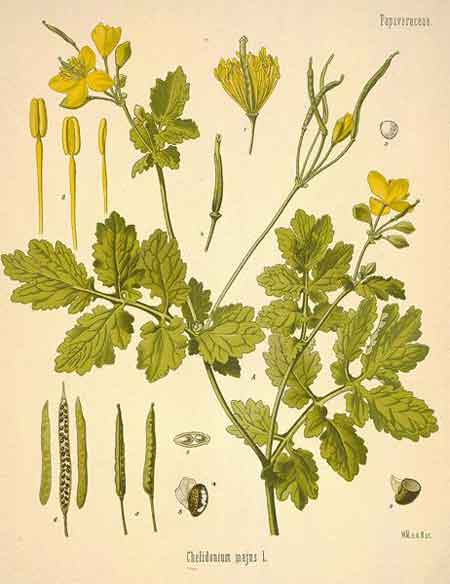
Vertues and Use -- The Herb or Roots boyled in white-Wine and drunk, a few Aniseeds being boyled therwith, openeth Obstructions of the Liver and Gall, helpeth the yellow Jaundice: and the often using it, helps the Dropsie, and the Itch, and those that have old Sores in their Legs, or other parts of the Body. The Juyce thereof taken fasting, is held to be of singular good use against the Pestilence: The distilled Water, with a little sugar, and a little good Triacle mixed therwith (the party upon the taking being laid down to sweat a little) hath the same effect. The Juyce dropped into the Eyes clenseth them from Films and the Cloudiness which darken the sight, but it is best to allay the sharpnes of the Juyce with a little Breast-milk: It is good in old filthy corroding creeping Ulcers whersoever, to stay their malignity of fretting and running, and to cause them to heal the more speedily: The Juyce often applied to Tetters, Ringworms, or other such like spreading Cancers, will quickly heal them, and rubbed often upon Warts will taken them away. The Herb with the Roots bruised and heated with Oyl of Camomel, applied to the Navel, taketh away the griping pain in the Belly and Bowels, and all the pains of the Mother: and applied to Womens Breasts stayeth the overmuch flowing of their Courses. The Juyce Decoction of the Herb gargled between the Teeth that ake, easeth the pain; and the Pouder of the Dryed Root, laid upon an aching hollow, or loos Tooth, wil cause it to fal out. The Juyce mixed with som Pouder of Brimstone, is not only good against the Itch, but taketh away al discolourings of the Skin whatsoever: And if it chance that in a tender Body it causeth any Itching or Inflamation, by bathing the place with a little Vinegar it is helped.
This is an Herb of the Sun, & under the Coelestial Lyon, and is one of the best cures for the Eyes that is. Al that know any thing in Astrologie, know as wel as I can tel them, That the Eyes are subject to the Luminaries; let it then be gathered when the Sun is in Leo, and the Moon in Aries applying to his Trine; let Leo arise, then may you make it into an Oyl or Oyntment which you please to anoint your sore Eyes withal: I can prove it both by my own experience, and the experience of those to whom I have taught it, That most desperat sore Eyes have been cured by this only Medicine; And then I pray, is not this farbetter than endangering the Eyes by the art of the Needle? for if this do not absolutly take away the Film, it wil so facilitate the work that it may be don wihout danger.
Another il-favored trick have Physitians got to use to the Eye, and that is worse than the Needle; which is, To eat away the Film by corroding or gnawing Medicines. This I absolutly protest against.
1. Because the Tunicles of the Eye are very thin, and therfore soon eaten asunder.
2. The Callus or Film that they would eat away is seldom of an equal thickness in every place, and then the Tunicle may be eaten asunder in one place, before the Film be consumed in another, and so be a readier way to extinguish the sight than to restore it.
It is called Chelidonium from the Greek word chelidon which signifies a Swallow, because they say, That if you prick out the Eyes of yong Swallows when they are in the Nest, the old ones wil recover their Eyes again with this Herb. This I am confident, for I have tried it, That if you mar the very Apple of their Eyes with a Needle, she wil recover them again, but whether with this Herb or no I know not.
Also I have read (and it seems to be somwhat probable) That the Herb being gathered as I shewed before, and the Elements drawn apart from it by the art of the Alchymist, and after they are drawn apart, rectified, the earthy quality still in rectifying them, added to the Terra damnata (as Alchymists call it) or Terra sacratissima (as som Phylosophers call it) the Elements so rectified are sufficient for the Cure of al Diseases, the humor offending being known and the contrary Element given, It is an Experience wurth the trying, and can do no harm. |
If in your teeth you hap to be tormented,
By meane some little wormes therein do breed,
Which paine (if heed be tane) may be preuented,
By keeping cleane your teeth, when as you feede:
Burne Frankomsence (a gum not euil sented),
Put Henbane vnto this, and Onyon-seed,
And in a Tunnel to the tooth that's hollow,
Conuey the smoake thereof, and ease shall follow.
By Nuts, Oyle, Eeles, and cold in head
By Apples and raw fruites is hoarsness bred. |
|
| HENBANE (from Culpeper, p. 64):
Our common Henbane hath very large, thick, soft, wooly Leavs lying upon the ground, much cut in or torn on the edges of a dark ill grayish green colour, among which rise up divers thick & short Stalks two or three foot high, spread into divers smaller Branches with lesser Leavs on them, and many hollow Flowers scarce appearing above the Husks, and usually torn on the one side, ending in five round points growing one above another, of a deadish yellow colour, somwhat paler toward the edges, with many purplish Veins therein, and of a dark yellowish purple in the bottom of the Flower, with a smal pointel of the same colour in the middle, each of them standing in hard close Husk, which after the Flower is past, groweth very like the Husk of Asarabacca, and somwhat sharp at the top Points, wherein is contained much smal Seed very like Poppy Seed, but of a dusky grayish colour. The Root is great, white and thick, branching forth divers waies under ground, so like a Parsnip Root (but that it is not so white) that it hath deceived divers. The whol Plant more than the Root hath a heavy ill soporiferous smell somwhat offensive.
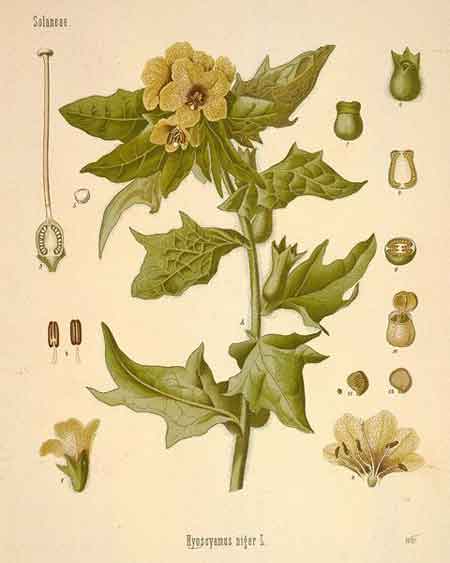
Vertues and Use -- The Leavs of Henbane do cool all hot Inflamations in the Eyes or any other part of the Body; and are good to asswage all manner of Swellings of the Cods or Womens Breasts, or els where, if they be boyled in Wine, and either applied themselves or the Fomentation warm; it also asswageth the pain of the Gout, the Sciatica and all other pains in the Joynts which arise from an hot caus. And applied with Vinegar to the Forehead and Temples, helpeth the Headach and want of sleep in hot Feavers. The Juyce of the Herb or Seed, or the Oyl drawn from the Seed doth the like. The Oyl of the Seed is helpful for the Deafness, Nois, and Worms in the Ears, being dropped therein; the Juyce of the Herb, or Root doth also the same. The Decoction of the Herb, or Seed, or both, killeth Lice in Man and Beast. The fume of the dried Herb Stalks and Seed burned, quickly healeth Swellings, Chilblains, or Kibes in the Hands or Feet, by holding them in the fume thereof. The Remedy to help those that have taken Henbane is to drink Goats Milk, Honyed Water or Pine Kernels, with Sweet Wine: or in the absence of these, Fennel Seed, Nettle Seed, the Seed of Cresses, Mustard, or Radish, as also Onions, or Garlick taken in Wine, do all help to free them from danger, and restore them to their due temper again.
Take notice that this Herb must never be taken inwardly, outwardly, an Oyl, Oyntment, or Plaister of it, is most admirable for the Gout, to cool the Venerial heat of the Reins in the French Pox, to stop the Toothach being applied to the aching side, to allay all Inflamations, and to help the Diseases before premised.... |
